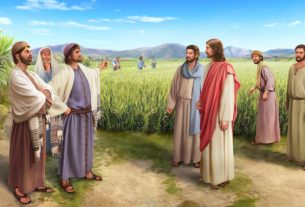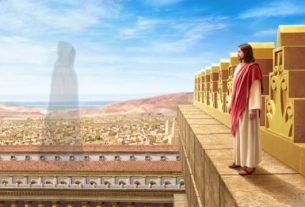The Resurrection of Lazarus Glorifies God
(John 11:43-44) And when he thus had spoken, he cried with a loud voice, Lazarus, come forth. And he that was dead came forth, bound hand and foot with grave clothes: and his face was bound about with a napkin. Jesus said to them, Loose him, and let him go.
Among the miracles performed by the Lord Jesus, we have selected only these two because they are adequate to demonstrate what I’d like to speak about here. These two miracles are really astonishing, and they are very representative of the Lord Jesus’ miracles in the Age of Grace.
…
Next, let’s look at this passage: The Resurrection of Lazarus Glorifies God.
What’s your impression after reading this passage? The significance of this miracle that the Lord Jesus performed was much greater than the previous one because no miracle is more astounding than bringing a dead man back from the grave. The Lord Jesus doing something like this was extremely significant in that age. Because God had become flesh, people could only see His physical appearance, His practical side, and His insignificant side. Even if some people saw and understood some of His character or some strengths that He appeared to have, no one knew where the Lord Jesus came from, who His essence truly was, and what more He really could do. All of this was unknown to mankind. Too many people wanted proof of this thing, and to know the truth. Could God do something to prove His own identity? For God, this was a breeze—it was a piece of cake. He could do something anywhere, anytime to prove His identity and essence, but God did things with a plan, and in steps. He didn’t do things indiscriminately; He looked for the right time, and the right opportunity to do something most meaningful for mankind to see. This proved His authority and His identity. So then, could the resurrection of Lazarus prove the Lord Jesus’ identity? Let’s look at the scripture: “And when he thus had spoken, he cried with a loud voice, Lazarus, come forth. And he that was dead came forth.” When the Lord Jesus did this, He said just one thing: “Lazarus, come forth.” Lazarus then came out from his tomb—this was accomplished because of a single line uttered by the Lord. During this time, the Lord Jesus did not set up an altar, and He didn’t carry out any other actions. He just said one thing. Would this be called a miracle or a command? Or was it some sort of wizardry? On the surface, it seems it could be called a miracle, and if you look at it from a modern perspective, of course you could still call it a miracle. However, it certainly could not be called a spell to call a soul back from the dead, and absolutely not a sorcery. It is correct to say that this miracle was the most normal, tiny little demonstration of the Creator’s authority. This is the authority, and the ability of God. God has the authority to have a person die, to have his soul leave his body and return to Hades, or wherever it should go. When someone dies, and where they go after death—these are determined by God. He can do this anytime and anywhere. He is not constrained by humans, events, objects, space, or place. If He wants to do it He can do it, because all things and living beings are under His rule, and all things live and die by His word, His authority. He can resurrect a dead man—this is also something He can do anytime, anywhere. This is the authority that only the Creator possesses.
When the Lord Jesus did something such as bringing Lazarus back from the dead, His goal was to give proof for humans and for Satan to see, and to let humans and Satan know that mankind’s everything, mankind’s life and death are determined by God, and that even though He had become flesh, as always, He remained in command of the physical world that can be seen as well as the spiritual world humans cannot see. This was to let humans and Satan know that mankind’s everything is not under the command of Satan. This was a revealing and a demonstration of God’s authority, and it was also a way for God to send a message to all things that mankind’s life and death is in God’s hands. The Lord Jesus’ resurrection of Lazarus—this type of approach was one of the ways for the Creator to teach and instruct mankind. It was a concrete action in which He used His ability and authority to instruct mankind, and to provide for humans. It was a way without words for the Creator to allow mankind to see the truth of Him being in command of all things. It was a way for Him to tell mankind through practical actions that there is no salvation other than through Him. This type of silent means of His instructing mankind lasts forever—it is indelible, and it brought to human hearts a shock and enlightenment that can never fade. The resurrection of Lazarus glorified God—this has a deep impact on every single one of God’s followers. It firmly fixes in every person who deeply understands this event the understanding, the vision that “only God can command mankind’s life and death.” Although God has this type of authority, and although He sent a message about His sovereignty over mankind’s life and death through the resurrection of Lazarus, this was not His primary work. God never does something without meaning. Every single thing He does has great value; it is all a classic treasure. He absolutely would not make a person coming out of their tomb into the primary or the sole goal or item in His work. God does not do anything that is without meaning. One resurrection of Lazarus is adequate to demonstrate God’s authority. It is adequate to prove the identity of the Lord Jesus. This is why the Lord Jesus did not repeat this type of miracle. God does things according to His own principles. In human language, it would be “God is mindful of serious work.” That is, when God does things He does not stray from the purpose of His work. He knows what work He wants to carry out in this stage, what He wants to accomplish, and He will work strictly according to His plan. If a corrupt person had that kind of ability, he would just be thinking of ways to reveal his ability so that others would know how formidable he was, so they would bow down to him, so he could control them and devour them. This is the evil that comes from Satan—this is called corruption. God does not have such disposition, and He does not have such essence. His purpose in doing things isn’t to show Himself off, but to provide mankind with more revelation and guidance, so people see very few examples in the Bible of this type of thing. This doesn’t mean that the Lord Jesus’ abilities were limited, or that He couldn’t do that type of thing. It’s simply that God didn’t want to do it, because the Lord Jesus resurrecting Lazarus had very practical significance, and also because the primary work of God becoming flesh wasn’t performing miracles, it wasn’t bringing people back from the dead, but it was the work of redemption for mankind. So, much of the work that the Lord Jesus completed was teaching people, providing for them, and helping them, and things such as resurrecting Lazarus were merely small portions of the ministry that the Lord Jesus carried out. Even more, you could say that “showing off” isn’t a part of God’s essence, so not showing more miracles wasn’t intentionally exercising restraint, nor was it due to environmental limitations, and it certainly wasn’t a lack of ability.
When the Lord Jesus brought Lazarus back from the dead, He used one line: “Lazarus, come forth.” He said nothing aside from this—what do these words represent? They represent that God can accomplish anything through speaking, including resurrecting a dead man. When God created all things, when He created the world, He did so with words. He used spoken commands, words with authority, and just like that all things were created. It was accomplished like that. This single line spoken by the Lord Jesus was just like the words spoken by God when He created the heavens and earth and all things; it equally held the authority of God, the ability of the Creator. All things were formed and stood fast because of words from God’s mouth, and just the same, Lazarus walked out from his tomb because of the words from the Lord Jesus’ mouth. This was the authority of God, demonstrated and realized in His incarnate flesh. This type of authority and ability belonged to the Creator, and to the Son of man in whom the Creator was realized. This is the understanding taught to mankind by God bringing Lazarus back from the dead. That’s all on this topic. Next, let’s read the scriptures.
from “God’s Work, God’s Disposition, and God Himself III”




-305x207.jpg)